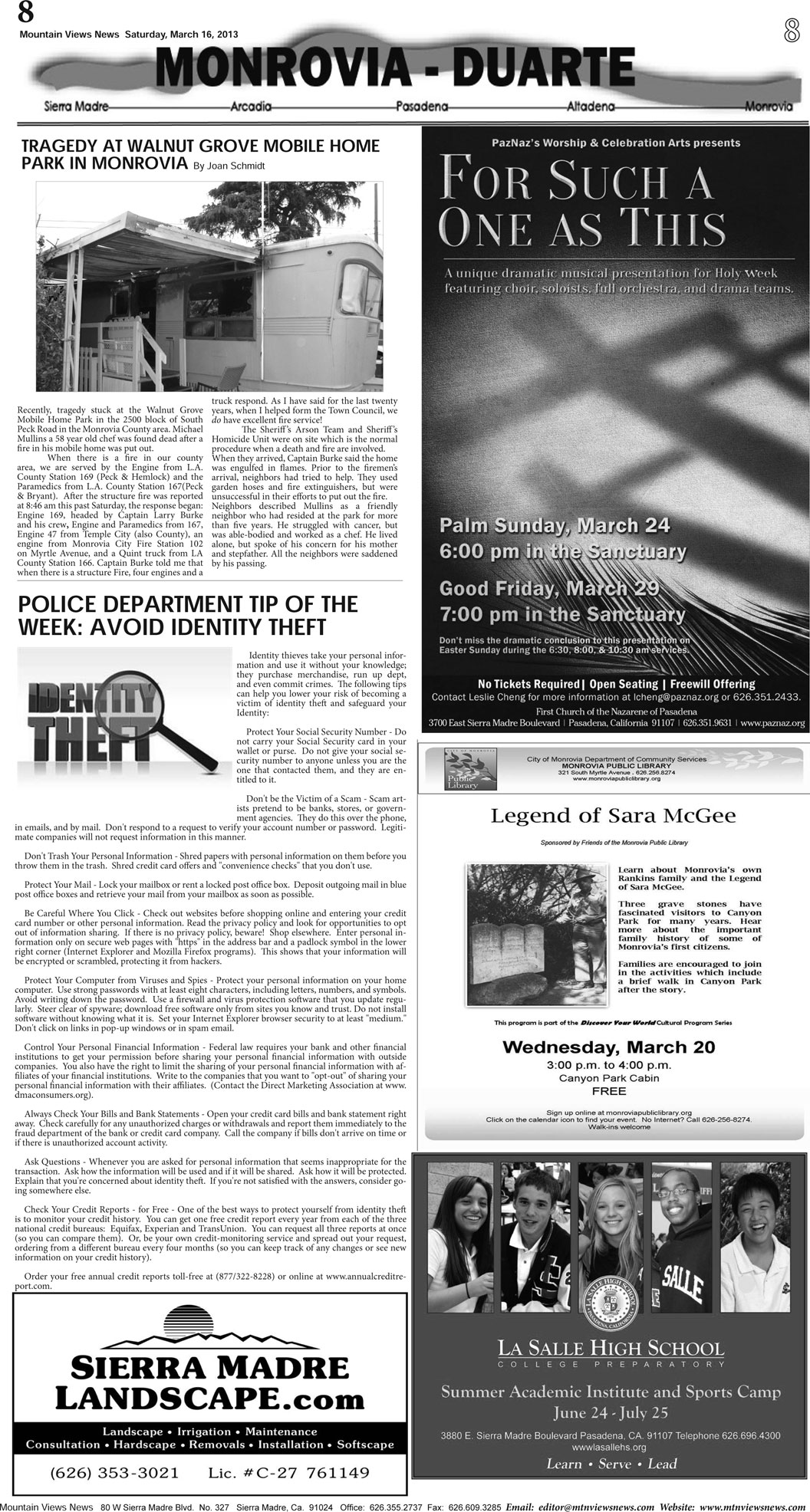|

8
8
Mountain Views News Saturday, March 16, 2013
TRAGEDY AT WALNUT GROVE MOBILE HOME
PARK IN MONROVIA By Joan Schmidt
Recently, tragedy stuck at the Walnut Grove
Mobile Home Park in the 2500 block of South
Peck Road in the Monrovia County area. Michael
Mullins a 58 year old chef was found dead after a
fire in his mobile home was put out.
When there is a fire in our county
area, we are served by the Engine from L.A.
County Station 169 (Peck & Hemlock) and the
Paramedics from L.A. County Station 167(Peck
& Bryant). After the structure fire was reported
at 8:46 am this past Saturday, the response began:
Engine 169, headed by Captain Larry Burke
and his crew, Engine and Paramedics from 167,
Engine 47 from Temple City (also County), an
engine from Monrovia City Fire Station 102
on Myrtle Avenue, and a Quint truck from LA
County Station 166. Captain Burke told me that
when there is a structure Fire, four engines and a
truck respond. As I have said for the last twenty
years, when I helped form the Town Council, we
do have excellent fire service!
The Sheriff’s Arson Team and Sheriff’s
Homicide Unit were on site which is the normal
procedure when a death and fire are involved.
When they arrived, Captain Burke said the home
was engulfed in flames. Prior to the firemen’s
arrival, neighbors had tried to help. They used
garden hoses and fire extinguishers, but were
unsuccessful in their efforts to put out the fire.
Neighbors described Mullins as a friendly
neighbor who had resided at the park for more
than five years. He struggled with cancer, but
was able-bodied and worked as a chef. He lived
alone, but spoke of his concern for his mother
and stepfather. All the neighbors were saddened
by his passing.
POLICE DEPARTMENT TIP OF THE
WEEK: AVOID IDENTITY THEFT
Identity thieves take your personal information
and use it without your knowledge;
they purchase merchandise, run up dept,
and even commit crimes. The following tips
can help you lower your risk of becoming a
victim of identity theft and safeguard your
Identity:
Protect Your Social Security Number - Do
not carry your Social Security card in your
wallet or purse. Do not give your social security
number to anyone unless you are the
one that contacted them, and they are entitled
to it.
Don't be the Victim of a Scam - Scam artists
pretend to be banks, stores, or government
agencies. They do this over the phone,
in emails, and by mail. Don't respond to a request to verify your account number or password. Legitimate
companies will not request information in this manner.
Don't Trash Your Personal Information - Shred papers with personal information on them before you
throw them in the trash. Shred credit card offers and "convenience checks" that you don't use.
Protect Your Mail - Lock your mailbox or rent a locked post office box. Deposit outgoing mail in blue
post office boxes and retrieve your mail from your mailbox as soon as possible.
Be Careful Where You Click - Check out websites before shopping online and entering your credit
card number or other personal information. Read the privacy policy and look for opportunities to opt
out of information sharing. If there is no privacy policy, beware! Shop elsewhere. Enter personal information
only on secure web pages with "https" in the address bar and a padlock symbol in the lower
right corner (Internet Explorer and Mozilla Firefox programs). This shows that your information will
be encrypted or scrambled, protecting it from hackers.
Protect Your Computer from Viruses and Spies - Protect your personal information on your home
computer. Use strong passwords with at least eight characters, including letters, numbers, and symbols.
Avoid writing down the password. Use a firewall and virus protection software that you update regularly.
Steer clear of spyware; download free software only from sites you know and trust. Do not install
software without knowing what it is. Set your Internet Explorer browser security to at least "medium."
Don't click on links in pop-up windows or in spam email.
Control Your Personal Financial Information - Federal law requires your bank and other financial
institutions to get your permission before sharing your personal financial information with outside
companies. You also have the right to limit the sharing of your personal financial information with affiliates
of your financial institutions. Write to the companies that you want to "opt-out" of sharing your
personal financial information with their affiliates. (Contact the Direct Marketing Association at www.
dmaconsumers.org).
Always Check Your Bills and Bank Statements - Open your credit card bills and bank statement right
away. Check carefully for any unauthorized charges or withdrawals and report them immediately to the
fraud department of the bank or credit card company. Call the company if bills don't arrive on time or
if there is unauthorized account activity.
Ask Questions - Whenever you are asked for personal information that seems inappropriate for the
transaction. Ask how the information will be used and if it will be shared. Ask how it will be protected.
Explain that you're concerned about identity theft. If you're not satisfied with the answers, consider going
somewhere else.
Check Your Credit Reports - for Free - One of the best ways to protect yourself from identity theft
is to monitor your credit history. You can get one free credit report every year from each of the three
national credit bureaus: Equifax, Experian and TransUnion. You can request all three reports at once
(so you can compare them). Or, be your own credit-monitoring service and spread out your request,
ordering from a different bureau every four months (so you can keep track of any changes or see new
information on your credit history).
Order your free annual credit reports toll-free at (877/322-8228) or online at www.annualcreditreport.
com.
|